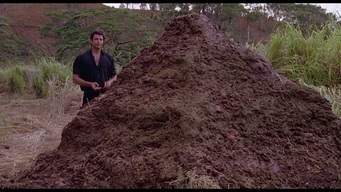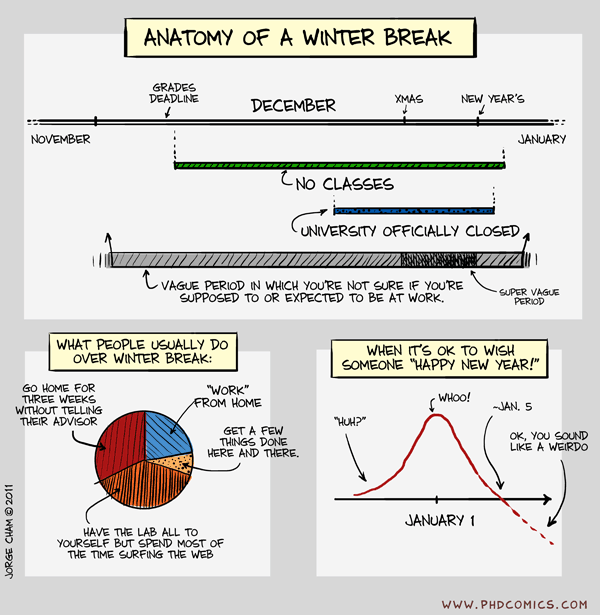|
I'm working on a series of posts right now about things I've learned in grad school to expand on a couple of my most visited posts: Top 10 things I learned during the first semester, and 5 things I learned over my first summer! Follow along here and on Twitter, @MassSpecMaven, #thingsilearnedingradschool.
#1: Work Smart, Not Hard #2: Failure and Conflict are Inevitable #3: Literature Before Lab #4: Too Much Autonomy Can Actually Hurt You #5: Support Networks are the Bee's Knees #6: Never stop asking "Why?" #7: There's Time for Social Media #8: Relationships Are Hard(er) #9: Perspective, Get a Regular Dose #10: Comparison is the Thief of Joy
2 Comments

Disclaimer: I am not a relationship counselor. But since this is part of my 10 more things I learned in gradschool, these are a few pieces of advice based on my own experiences. Psychology/counseling friends, please feel free to add your academically-informed advice in the comments. :)
Okay, with that out of the way, here goes. This doesn't seem to be a topic everyone is super comfortable talking about, but when it does come up in conversation, everyone seems to be on the same page: whether it be a friend or a romantic partner, or even a professional relationship, finding and maintaining relationships generally gets a little harder in grad school. Why the heck is that? How can you start combat that? 
This fourth year of the PhD is no joke y'all. But even though grad school is packed with classes, teaching, grading, experiments in lab or the field, writing, or making posters and talks for conferences, there's still time for social media! Or I guess what I'm saying is that it's worth it to make time. Here's why...

We all start out questioning the world around us. Even before we can communicate out loud, we resort to using our other senses to better understand anything and everything we can. It’s almost biological. Somewhere along the line though, whether it be by society’s erroneous design or as a result of collective, subconscious “bad habits”, we implicitly start to reel in that curiosity as we grow up. I can’t help but note that unfortunately, this is especially true in young girls, but that’s a post for a different day.

Have you ever felt, since coming to grad school, that there’s kind of this unspoken expectation that if you can’t figure something out on your own, you might just not be cut out for the job?
You may have had a professor in class give you strange look when you asked a question, or your adviser gave you grief about not finishing up a tough experiment faster, or you see another grad student getting all of this stuff done while you’re over here adding ‘take shower’ to your to-do list so you feel like you at least got something done? Don't judge me.
This ‘episode’ of #thingsilearnedingradschool will be quick since I think it’s an easy one! It’s an easy one to explain anyway. Maybe not so easy to master. But, hopefully this will help!
 "That is one big pile of shit." "That is one big pile of shit."
It's no secret that getting a graduate degree is anything but easy. There are going to be days where the “Valley of Shit” starts to look like there's no way out. You’ll start to question why you’re here. Wonder whether any of your work actually matters to anyone. You’ll start to daydream about the countless other things you could be doing with your young adult life. And yes. There will be the days where you seriously contemplate leaving. And to be honest with you, I think it takes more strength to leave than it does to stay. If somewhere along the way, you realize that you no longer need a graduate degree for the career you want to pursue, or you don’t even want to stay in the field you’re in at all anymore, it's hard to get out of your own ego, stop thinking about what others will think or say, and just own the decision you've made. I completely understand that until academia makes a conscious effort to change the culture around what it means to be a graduate student in STEM, we're going to continue to have students making the decision to pursue alternative careers that offer better incentives for their time and effort.
That being said, grad school can also be a very fulfilling experience for those who choose to stay. Among the tough days, there will also be days where you remember why you're here, and how you're going to get through it all. You'll see light at the end of the tunnel, and daydream about what it will feel like to finally say to yourself, "I did it". In the beginning, on top of classes, teaching, research, and hard deadlines for posters, papers, and presentations, you spend quite a bit of time just figuring out what it means to be a graduate student. Right around year two or three, no matter how much you prepare, there's going to be a few 'surprises' that make you question if this is the right path for you. Lesson number two of these 10 More #ThingsILearnedinGradSchool, stepping in shit, and learning how to deal with it, is part of the process.
 Last but certainly not least in this series of phenomenal women in STEM is Beth Papanek, a graduate of the Bredesen Center's Energy Science and Engineering PhD program (a third year at the time this blog was published). She grew up northwest of Chicago and attended the University of Illinois Urbana-Champaign for her Bachelor's in Chemistry and a Professional Science Master's in Bioenergy. After spending years in a very academically-minded chemistry department, Beth decided that she wanted to work in a more applied field. Some business classes and experience with Illinois Business Consulting led her to her current career path working with technology transfer and commercialization. Her graduate work dealt with the characterization of Clostridium beijerinckii for the production of butanol as a biofuel. Her research in the lab of Dr. Adam Guss with the BioEnergy Science Center (BESC) focused on generating metabolomic data to use in conjunction with metabolic models to better understand the organism's switch from acid production to solvent production. Here, Beth summarizes her experiences at the interface of science and entrepreneurship. She describes how she has been able to navigate her way through these two male-dominated fields to find the support system and encouragement she needed to be successful, but emphasizes a need for women to take the reins and make the success on their own too.  As Women's History Month comes to a close, these next two featured women in STEM describe both the many opportunities, and challenges, that exist for graduate students before, during, and after graduate school. Eva Mutunga, a first-year Bredesen Center student, recalls an experience from her first week of classes last fall where she battled through feelings of uncertainty and gracefully managed an uncomfortable situation of potential bias and prejudice. She highlights how her ability to embrace change and seek out peer mentors has helped her stay resilient, confident, and motivated. Born and raised in Kenya, Eva's fascination with engineering first began when she would watch the bellies of low-flying planes passing over her home in Nairobi. After moving to the states, Eva obtained her undergraduate degree at the University of the District of Columbia in mechanical engineering where she worked with Dr. Kate Klein at the National Institute of Standards and Technology on studying helium ion material interaction in both thin films and bulk substrates of various materials. She is now pursuing her doctoral degree in Energy Science and Engineering with a focus in materials science at the University of Tennessee. She is currently working on the morphological characterization of directed-assembly metal nanoparticles and substrate interface under the guidance of Dr. Jason Fowlkes at the Center for Nanophase Materials at Oak Ridge National Laboratory. Eva is adventurous and likes to try lots of new things but one of her favorite things to do is dance. |
Hello!Welcome to Think Like a Postdoc. If you're a fan of science as much as I am, and/or are curious about getting a degree in a STEM field, or pursuing an interdisciplinary graduate degree (all from the perspective of a graduate student), then you're in the right place. Think Like a Postdoc also includes posts about my current lab and field research, including analytical chemistry, Arctic biogeochemistry, and energy & environmental policy. Comments and questions are always welcomed. And please tell me what you want to hear about next! Top PostsQuestions to Ask Before Choosing Grad Program
Dirt Popsicle First Semester of Grad School Field Work in Alaska Science Conference Dos and Don'ts Women in STEM Series Things I've Learned in Grad School Series Blogs I FollowMass Spectrometry Blog
Metabolon Compound Interest The Grad Student Way SouthernFriedScience Science Blogs Anthony's Science Blog The Thesis Whisperer GradHacker Fossils and Shit Science Communication Breakdown Science Communication Media Categories
All
Blog Archives
August 2017
|

 RSS Feed
RSS Feed

